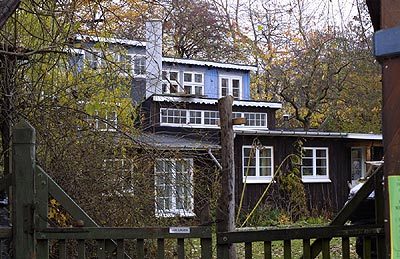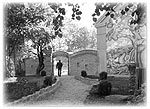Christiania
nn - 14.05.2007 23:49
If you are looking for an inspiring and different kind of place........


House on the Childrens Meadow

Main entrance to Christiania

If you are looking for an inspiring and different kind of place
then go and see Christiania !
It might be your very last chance as the government is planning
to close it down in the near future.
Christiania is an autonomous community that started 33 years ago following the civil occupation of an unused area, then owned by the Ministry of Defence.
It is an unparalleled example of human entrepreneurship and innovative spirit.
Art
Christiania has been described as a life surrounded by art. There is art everywhere. Many of the houses, which have been built by the present or previous inhabitants and which nobody owns, are works of art in themselves, and are often studied and admired by students from the nearby School of Architecture. Everywhere you go in Christiania there are paintings and sculptures, and there is always live music or theatre playing somewhere. Christiania has several of its own art galleries.
A social and healthy life
Christianites have the opportunity to live a socially active and responsible existence as they have a high level of influence on their everyday lives. Diversity of opinions and attitudes among your peers is encouraged. Consensus democracy, despite the lengthy negotiations that are needed to reach common consent, provides unity and realistic solutions. A strong social network is a well-developed part of the community. This leads to an improved quality of life and a safety-net for the inhabitants. From an early age the children of Christiania roam freely within the area. We all know each other�s children and where they live. The elderly and infirm are also taken care of by neighbours and the Citizens Council. Today, Christiania has four day-care institutions, which are paid for by the entire community.
Social networking
Neighbourliness is of vital importance for the life of Christiania. Most of the 800 inhabitants know each other and help with everything from house construction to talking confidentially. Christiania also attracts a large number of people from the surrounding city who do not feel comfortable in modern society. They are well accepted, and are often integrated to the extent that they can provide small-scale services for Christiania. This gives them a meaningful existence and the satisfaction of fulfilling a role in a larger context.
The story of Christiania
The story of Christiania is colourful, long, and filled with battles, victories and defeats. Many of the people who began the experiment do not live here anymore, but the dream of a life of freedom and the idea of a place ruled by its inhabitants endures. Now 33 years on, people from near and far still feel attracted to the magical mixture of anarchy and love of this community. It all began in 1970 when a group of citizens knocked down the fence around an extensive area previously used by the Ministry of Defence. They wanted a playground for their kids and something green to look at. The same year an article in an alternative newspaper was published in connection with an art exhibition. The article discussed the abandoned military area and suggested that it be used for the numerous young people who were unable to find accommodation elsewhere. The article resulted in the massive immigration of people from all sections of society, who came to create an alternative life based on communal living and freedom. This was the birth of Christiania.
Self-government
Since its birth, Christiania has been associated with rebellion against the prevailing system, and for just as long, it has experimented with new forms of democracy and ways of self-government. Based on the idea of maximizing freedom and giving power to the individual, Christiania has organized itself into a number of councils. The Citizens Council is the ultimate ruling body of Christiania. The name indicates the fact that this is the forum where all Christianites discuss common problems; such as deciding whether Christiania should cooperate with the Danish authorities, or if violent inhabitants should be expelled. Anything relating to the community is discussed here. Decisions are not made by majority vote, or voting as it is normally known, but by consensus, which means that everybody has to reach agreement on the subject under discussion. Decisions taken this way are, of course, very easy to carry out and lead to a high degree of satisfaction. In contrast, many decisions with far-reaching consequences have been taken in Denmark during the same period - by referenda - especially in relation to the European Union. In these instances the Danish population has often been split almost equally for and against the EU.
The way that Christiania organizes itself is essentially the heart of the socio-political experiment, which is what the Christianites would not live without. People's lives in Christiania are based on common sense rather than on laws; Christiania has no laws. There are a few prohibitions, however:
No hard drugs
No weapons
No violence
No trading with buildings or residential areas
Maintenance
Christiania is responsible for any maintenance that needs to be carried out in the area. This includes the entire infrastructure, such as water and sewage, roads, electricity, landscaping, etc., and also telecommunications. Christiania was one of the first places in Denmark to provide high speed internet connections at low cost. This means that a large number of inhabitants have internet access and that Christiania has a highly developed electronic information structure, reflected by web-, mail, ICMP, DNS and other servers maintained by local users.
Maintenance
Christiania is responsible for any maintenance that needs to be carried out in the area. This includes the entire infrastructure, such as water and sewage, roads, electricity, landscaping, etc., and also telecommunications. Christiania was one of the first places in Denmark to provide high speed internet connections at low cost. This means that a large number of inhabitants have internet access and that Christiania has a highly developed electronic information structure, reflected by web-, mail, ICMP, DNS and other servers maintained by local users.
Drugs
Marihuana has been an integral part of Christiania from the very start. During the late '90s sales to visitors accelerated and it became a multi-million business, drawing much attention from the rest of Christiania. Early this year, however, the pushers cleared the street where they sold their wares, and the police, furthermore, arrested many of their number. This, of course, does not mean the market for marihuana in Denmark has disappeared; the trade has just moved to other places in Copenhagen. Early on, Christiania realised that hard drugs could destroy its fragile society, and the inhabitants simply expelled vendors of anything other than marihuana. This has been respected ever since, and Christiania is the only place in Denmark where such drugs are not sold.
Christianshavn
Christianshavn is the old area of the city surrounding Christiania. Many of Christiania�s first citizens came from here and close ties between the two quarters have developed throughout the years. Many people from Christianshavn use Christiania as a leisure area and recreational site. Christiania is represented on the Local Council at Christianshavn and many conflicts are solved as well as debated here.
Christiania businesses
A number of companies have been established in Christiania over the course of time. In fact, per capita more companies are active in Christiania than in the rest of Denmark. Recent investigations carried out by, for instance, Richard Florida, Professor of Economics at Carnegie Mellon University in Pittsburgh, have pointed out that creative environments such as Christiania are particularly innovative. They furthermore attract a highly educated and creative work force, since diversity and a bohemian environment are often preferred by such people.
- Christiania bikes
The Christiania bike has its roots in the concept of car-free zones in the city. Since 1984 these special wide-load bikes have been found in the streets of Copenhagen. The product has been developed in close cooperation with its users, and standards of safety, quality and durability have been consistently applied. The Christiania bike is now known all over Denmark, as well as being exported to most of the rest of the world.
- The Women�s Smithy
The three women smiths have been manufacturing their creations since 1997, and produce specially designed arts and crafts for the home. Chairs, tables and other furniture as well as sculptures are their hallmark.
- Christiania's grocery
Most common necessities can be purchased here, with special emphasis on ecological products; newspapers, postcards and homeopathic products are also available. Some products are manufactured in Christiania: natural cosmetics, toothpaste, herbal tea, bread and cookies.
- The Recycling Hall
Recycling and ecology are inherent to Christiania. Many parts for house construction and repairs can be found in the Recycling Hall. The materials are provided both by Christianites and from outside.
- Other companies
Several other shops and companies are located in Christiania, including a computer shop that can solve any computer or network problems you may have, and a shoe shop that provides custom-made shoes.
Current status
Christiania is in great danger of extinction as the government is currently passing a law that will privatise all houses and apartments. Nobody owns their houses at the moment, and it is therefore possible for anyone to move in. This human diversity is what makes Christiania so special. Meanwhile, with the new law, which will also allow the government to remove a number of houses, construct exclusive new condominiums, and overrule any decision taken by the Christianites, Christiania will slowly die as new, wealthy people move in. Why? Perhaps Christiania has done too well and thereby drawn unwanted attention to the problems of Danish society in general, where loneliness is common and social relations are increasingly on the decline. Or maybe the government fears that a simple life style without stress and the long working hours needed to afford the consumer goods craved by the majority of the Danish population will catch on and spread. Or maybe it is just too tempting to sell the land, although a few hundred million Danish kroners are nothing in comparison with the value of Christiania for its inhabitants. Under all circumstances Denmark will lose one of its most interesting pieces of modern history and become a nation that is culturally impoverished.
Further information
Various sources of information are available.
The home page: www.christiania.org
Defense Christiania's site: www.forsvarchristiania.dk
New Forum is the information office for general information.
You are welcome to visit - or phone.
It also runs a library and is used for meetings, etc.
Telephone +45 32 95 65 07,
Opening hours: Monday - Thursday 12.00 - 18.00, Friday 12.00 - 16.00,
or you can send them a mail at  nytforum@christiania.org nytforum@christiania.org
Guided tours are regularly available, but special tours can also be arranged as well.
 bestilling@rundvisergruppen.dk or phone +45 32 57 60 05. bestilling@rundvisergruppen.dk or phone +45 32 57 60 05.
Press office
Open daily, including weekends 15:00-17:00.
Telephone +45 32 95 65 08 � outside opening hours you may try to reach us at +45 2862 0293.
Email:  aktion@christiania.org aktion@christiania.org
We can answer your questions, put you in touch with people with special knowledge, set up meetings with Christianites, for example, to arrange the writing of feature articles, take you on tours of the area, provide internet access and much more.
You are also welcome to just pop in if you are passing by.
We can be found in the Green Room next to Indk�beren (the grocer's shop).
|





